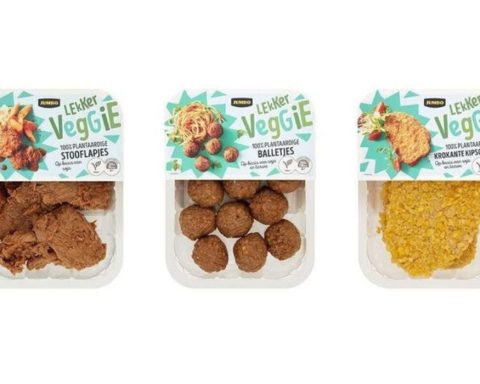At the intersection of Fulton Street and South Portland Avenue in Brooklyn’s Fort Greene neighbourhood stands a four-storey flatiron building circa 1930. It’s been designated the “Brooklyn Love Building,” written in blue wooden letters over its lime-green cornices above a mural of the late rapper the Notorious B.I.G. Over the years, the street-level corner unit has been occupied by a rotation of pizza, Mexican and brisket joints.
On a Saturday morning last September, a line formed up Fulton Street, with many sitting patiently in folding chairs for hours in anticipation of the newest tenant: Slutty Vegan, a fast-food chain from Atlanta. It was the first location to open in the northeast, and a section of the street was closed for the occasion. Eater NY called it “sexy meatless chaos.” A jubilant crowd filed in behind a velvet rope to not only get a first taste of the menu made famous on social media, but to see the force at the centre of the enterprise, Pinky Cole.
“Slutty Vegan is no longer an Atlanta love story,” she told the crowd.
It’s been a rapid climb for the 35-year-old entrepreneur. Cole started in 2018 filling orders from a ghost kitchen, expanded to a food truck, then opened her first permanent location, all between July and October of that year. Today, she has raised US$25 million in series A investment and the business has been valued at $100 million. She also launched a foundation to seed entrepreneurs of colour, published a cookbook with Simon & Schuster (Eat Plants, B*tch) and signed a deal with Steve Madden footwear to launch a vegan sneaker.
Cole has said that her Jamaican-born father, who was sentenced to life in prison the day she was born, encouraged her while he served time to have an entrepreneurial mindset. She had grown up mostly vegetarian thanks to her Rastafarian mom and went fully vegan nine years ago, saying that “it allowed me to be at my most optimal health.” After losing her first (vegetarian) restaurant in a fire, she eventually went after her dream of providing Atlanta’s west end with late-night vegan food options beyond salad and french fries.
“I knew if I named it ‘Pinky’s Vegan,’ nobody was coming,” Cole told the Baltimore Sun. “But if I named it Slutty Vegan, people would react.”
With burgers called Ménage à Trois, Super Slut and One Night Stand and the eponymous Slutty Fries, Cole has gone all-in on a radical update of what many call “SAD” (the standard American diet). Keeping some key principles of conventional fast food (speed, uniformity, brand familiarity, taste), Cole’s take is sex-positive, cholesterol free and resolute about making meatless comfort food accessible to the Black community. In many ways, Slutty Vegan synthesizes the tectonic shifts in American life since the origins of fast food (the civil rights movement, two waves of feminism, the environmental and animal rights movements). She is putting mainstream fast food on notice.
Cole is part of a new wave of vegan fast food proprietors who are looking to shake up the burgers-and-fries industry and a Black vegan food movement that includes two other start-ups that came on the scene in 2022: L.A.-based Hart House, founded by comedian Kevin Hart, and Vegan Wangs, founded in Atlanta by N’namdi Arinze. While big fast-food chains attempt to perform the balancing act of cutting beef emissions without cutting production (keeping consumers and ranchers happy), Cole and her peers are ditching it completely. The foundation of all their strategies: make the food undeniably tasty and as close as possible to what diners are used to.
Fast food’s existential crisis
It was in San Bernardino, California, the birthplace of fast food, that brothers Richard and Maurice McDonald first applied the principles of an assembly line to a commercial kitchen, calling it the Speedee Service System. In 1954, their busy restaurant caught the attention of Ray Kroc, a serial entrepreneur who saw the potential to scale the business to new heights. Kroc eventually manoeuvred the brothers out of the McDonald’s brand and expanded it into an international fast-food juggernaut.
The American roadside soon became adorned with golden arches and red-and-white buckets. By the end of the century, about a quarter of adults in the United States visited a fast-food restaurant on any given day. This new way of eating delivered on the promises of the post-war 1950s: prosperity, abundance, convenience and reliability. Today, the United States’ big-name quick-service restaurants (QSRs) are in more than 100 countries and expanding aggressively across India and China.
But over the last two decades, “the dark side of the all-American meal,” as Eric Schlosser, the author of Fast Food Nation, put it, has turned more consumers off meat. A sobering range of concerns, including deadly foodborne diseases, the horrors of abattoirs and the rainforest-clearing, climate-heating impacts of beef, have taken the lustre off fast food. One analysis showed that the CO2 emissions of a Quarter Pounder came to three kilograms per burger (compared to 0.12 kilos for a McPlant burger). That’s the equivalent of driving a car 16 kilometres. The 50 billion burgers Americans eat each year represent 50 billion mini carbon bombs in the U.S. alone.
With growing concerns about the high climate cost of commercial beef, fast-food brands have responded largely by coalescing around the “sustainable beef” movement while making bold net-zero pledges. McDonald’s, a signatory to the UN Race to Zero and a founding member of the Global Roundtable for Sustainable Beef, has a target of net-zero emissions by 2050. It’s also committed to reducing restaurant and office greenhouse gas (GHG) emissions by 36% by 2030 (from a 2015 baseline) and supply chain emissions intensity by 31% over the same period. Its latest progress report noted only a 2.9% reduction of office and retail emissions and a 7.8% reduction in supply chain emissions. Restaurant Brands International, whose portfolio includes Burger King, has also pledged to go net-zero by 2050.
The second fast-food revolution – hold the beef
Plant Power Fast Food was one of the first vegan chains in North America when it opened in 2016. Co-founder and former CEO Jeff Harris, who admittedly had reservations about America’s fast-food habit but knew it wasn’t going away, wanted to be the answer to the question “Who can become the vegan McDonald’s?” Part of his strategy was to recruit talent from the fast-food establishment to manage the operational challenges of growth and to work toward price parity with McDonald’s. He also avoided the pitfalls of “crunchy granola vegetarian restaurants,” as he put it, by remaining loyal to the enduring components of fast-food menus. Today, Plant Power has 12 locations in California and Nevada.
In Canada, Odd Burger has ambitious plans to disrupt the status quo of fast food. Like Slutty Vegan, it had humble early days as a food truck. CEO and co-founder James McInnes wanted more, and in 2017, he opened Canada’s first vegan fast food restaurant, then built a manufacturing facility where the company controls much of its own supply chain and does research and development. In 2021, Odd Burger became the first vegan fast food company in the world to go public (trading on the TSX Venture as ODD). Odd Burger has at least nine locations, with more planned in Canada, and a deal with a Swiss-based investment firm to develop up to 50 locations in Florida and Europe.
McInnes, who came from the tech world, says his strategy is to compete on all fronts by developing smooth franchising operations for ease of growth, leveraging automation to achieve price parity and investing heavily in R&D to perfect taste. He also has the grassroots piece, enabling customers to become investors “so they feel they are part of something, not just buying the product.” For McInnes, the stakes are high. “McDonald’s is not going to save us anytime soon,” he says. “The world needs a fast-food chain that aligns with people’s vision and ethics.” In a small affirmation of how things can change, Odd Burger’s CFO, Ted Sehl, is a former McDonald’s Canada executive (and is now vegan).
Irrespective of what might motivate consumers to try it, vegan fast food boasts much lower emissions than the “sustainable beef” approach, which relies heavily on offsetting emissions rather than reducing them. A life-cycle assessment from the University of Michigan showed that a Beyond Burger (sold at A&W, Denny’s, Carl’s Jr. and others), as one example, produces 90% fewer GHGs compared to a beef burger. In a Good Food Institute report on the state of the plant-based-alternatives industry, Caroline Bushnell, VP of corporate engagement, said, “Alternative proteins are to meat production as renewables are to energy: the future.” But, she noted, investment is “pennies on the dollar compared with investment in electric vehicles and renewable energy.”
McDonald’s is not going to save us anytime soon. The world needs a fast-food chain that aligns with people’s vision and ethics.
—James McInnes, CEO, Odd Burger
Still, global plant-based meat sales passed US$5 billion in 2021, and these vegan chains are as growth-minded as they are planet-conscious. As Pinky Cole told The Washington Post, she believes Slutty Vegan will be “bigger than McDonald’s and Burger King and Chick-fil-A.” Next Level Burger, which operates nine locations in the U.S., announced a $20-million fundraising round in late 2022, a stepping stone to CEO Matthew de Gruyter’s goal of opening 1,000 locations. With global fast-food sales expected to increase by 50% to nearly US$1 trillion by 2028, conditions for these big ambitions are promising.
And while it’s uncertain this new wave will overtake McDonald’s and Burger King, the big chains are listening. The last few years have seen a round of flirtations with vegan options, with varying zeal. In February, McDonald’s rolled out McPlant nuggets in 1,400 German locations; however, it wrapped up a test run of the McPlant burger at 500 U.S. locations, with no firm plans of rolling it out nationally. While Burger King U.K. has set a target of a 50% meat-free menu by 2030 and has done fully plant-based pop-ups, other chains have tested plant-based menu items and have discontinued them altogether.
When this happens, however, gaps in the market are opened for disruptors like Cole and McInnes to move in and meet demand, often in vegan food deserts. Case in point: Arinze opened Vegan Wangs in Atlanta last summer when KFC took Beyond Meat chicken wings off the menu after a limited-run pilot.
If they do succeed, we may be witnessing a second fast-food revolution. In the 1950s, the assembly-line model was the big disruptor, then became the industry standard. This time, it might be Slutty Vegan and Odd Burger setting the trends. The planet would certainly benefit. And if they flip the industry on its head, Cole and McInnes deserve to be in business-school textbooks beside Ray Kroc and the other founding fathers of fast food. What they have over the big guys is not easy to recreate in a corporate board room. As Cole says, “There’s nothing new about burgers and fries … it’s the intention behind it.”






